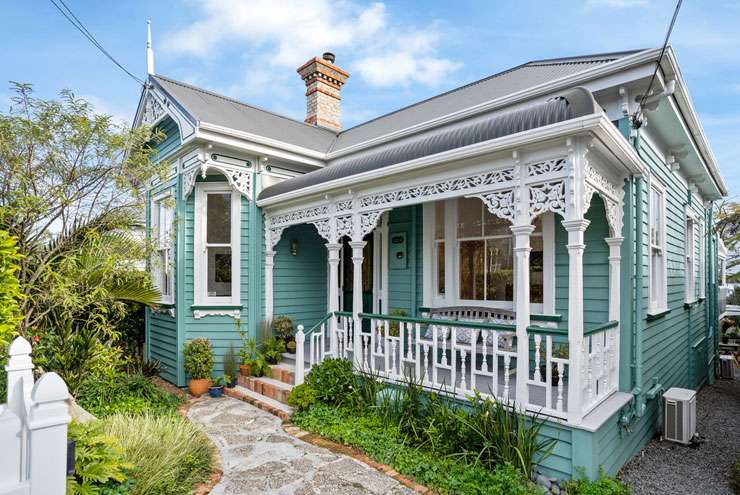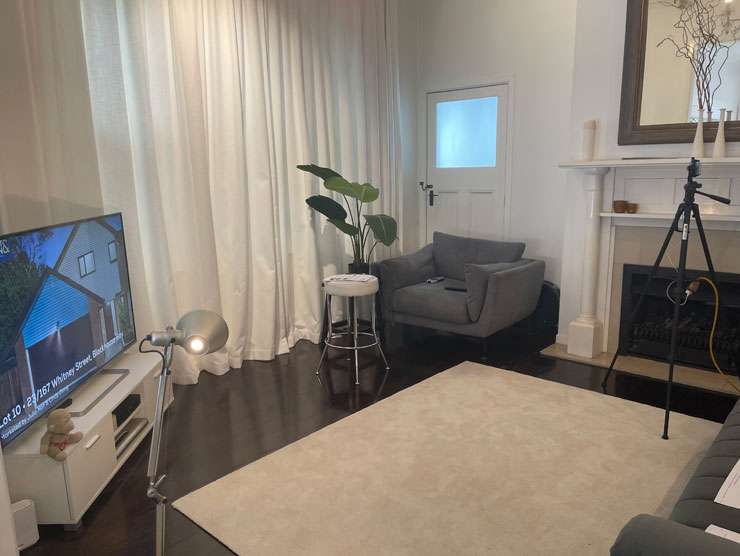How do you win an auction in lockdown?
For buyers looking to secure some real estate under alert levels four and three, bids have to be made online or by phone. Auction rooms, normally tense, crowded places, are now empty, with auctioneers bringing their gavels down on a podium set up in their own living rooms.
Since the country went into a hard lockdown last Wednesday, there have been a surprising number of big sales made via online auction platforms. A quick scan of the major real estate portals shows buyers are bidding high and bidding hard.
At Ray White's online auction on Wednesday, nine buyers registered to bid for a stylish three-bedroom villa in Auckland's Grey Lynn. The property on Farrar Street, listed with agent Luke Crawford, sold for $3.038 million - more than $1.8m above its 2017 CV - after 38 bids, while a rundown villa in nearby Millais Street, listed with Scott and Chloe Withers, fetched $2.525m at the same auction after 25 bids.
Start your property search
At Bayleys’ online auction on the same day, two beachfront homes in Mount Maunganui, Tauranga, sold for $2.4m and $1.5m respectively while a property in Katikati attracted 149 bids.
Simon Anderson, managing director of the Realty Group Ltd, which operates Eves and Bayleys, told the Bay of Plenty Times his team has had "exceptional" auctions in the past few days.
“It is a totally different scenario to last. Last lockdown a lot of auctions were postponed or pushed out and we didn't have the live stream capability. This time there is a lot of pent-up buyer interest going into lockdown and that interest has continued.”

A tidy three-bedroom villa in Auckland’s Grey Lynn sold for more than $3m at an online auction on Wednesday. Photo / Supplied
At Barfoot & Thompson’s auction on Friday, bidders were certainly acting with confidence. A three-bedroom townhouse in South Auckland sold for $927,000 - without any of the four bidders competing having stepped inside the house.
The property on Haven Drive, in East Tamaki, hit the market the day before lockdown, with the listing agent Cici Wang telling OneRoof: “It had no sign outside, no flyers. I hadn't even been inside it since the staging and photos were done. Nobody had seen it, but I had three calls immediately from people who wanted to see it once we were at level 3.”
However, by this Wednesday, another Barfoot & Thompson agent presented their buyer's cash unconditional offer which the vendor was happy to accept to bring the auction forward. By the morning of the auction, three other bidders had registered and in less than 12 minutes they had pushed the price from the opening $830,000 bid to the final $927,000.
“The vendor is shocked. It's my first experience of this in over a decade of selling,” Wang said.

Bayleys national auction manager Conor Patton: “Even if you’re very close to your limit, make it seem as if you could just keep going.” Photo / Fiona Goodall
Barfoot & Thompson auctioneer Murray Smith, who called the auction from his living room, added: “This home was in the right position, near the shops, it was relatively modern, brick not plaster - and it was affordable. People would know what they are getting, and it would be unlikely to be problems or fishhooks. You might see the same in [the Auckland suburbs of] Stonefields or Hobsonville Point - people know what they're getting in those streets.”
So if auctions are still as competitive as ever under level four conditions, how do buyers get ahead of the competition in the virtual auction room?
Bayleys national auction manager Conor Patton said the agency tries to make the process less stressful by partnering each potential buyer with an agent, who handles the Zoom calls while the buyer is bidding on the phone.
Patton said buyers who bid with confidence would have an advantage. “If people think you could bid forever because you’re bidding quickly and confidently, then that could give you the edge over your competition,” he said.
“Even if you’re very close to your limit, make it seem as if you could just keep going. For example, if your limit is $500,000 and the bid is $490,000 you should be coming back with $495,000 quickly instead of taking five minutes to decide because that’ll indicate to other buyers that you’re coming to an end.”

Ray White auctioneer Cameron Brain calls the shots from his home. Photo / Supplied

The new home of Barfoot and Thompson’s auctions - auctioneer Murray Smith’s lounge. Photo / Supplied
One thing buyers should prepare for is that online auctions can often take longer to complete than face-to-face auctions. “For me as an auctioneer, the main thing to be mindful of is giving people more time so the bids can be relayed. I’ve slowed down what I’m doing to allow for that.”
Cameron Brain, auction manager for Ray White City Realty Group in Auckland, said he schedules two auctions per a half-hour slot. He agrees with Patton that the process is slower than usual. “There’s some pausing because if I need to go talk to a vendor it’s not just a matter of going into a room; I actually have to pick up the phone,” he said.
His message to buyers was stay patient, be organised, listen to agent instructions and don’t hesitate.
While some buyers might think that not being able to see other bidders in the room puts them at a disadvantage, Brain stressed that this was not the case. “On a normal day a good 50% of our city apartment buyers are phone bidders, and I think people feel that bidding by phone is a strategic move in a lot of cases. I understand that you’re not seeing what other buyers are doing but you are hearing what’s going on and it’s become a norm to bid over the phone now.”
Harcourts national auction manager Aaron Davis said buyers now viewed online auctions as normal and that many had developed their own strategies when bidding. “Of course we prefer to see everybody but we can’t play any tricks or tell people to do something they don’t want to do. It’s what you’re comfortable with and comes down to personal choice,” he said.
- Additional reporting by Catherine Smith











































































